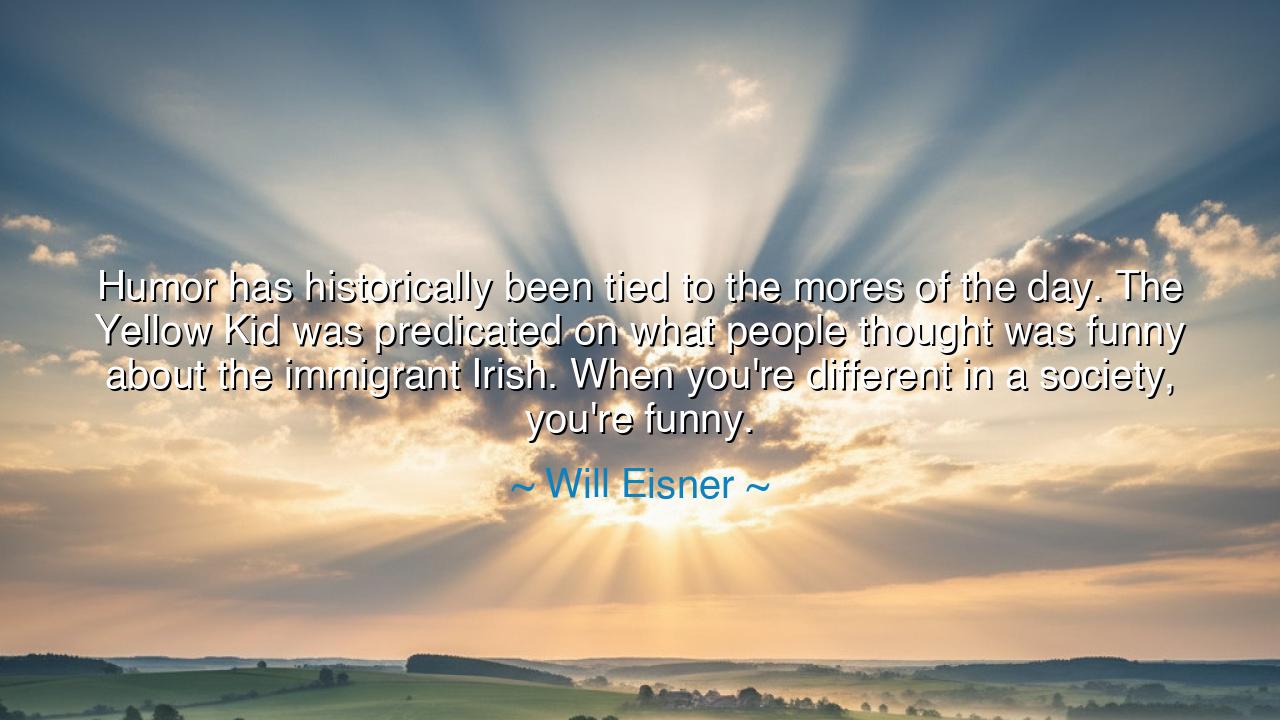
Humor has historically been tied to the mores of the day. The
Humor has historically been tied to the mores of the day. The Yellow Kid was predicated on what people thought was funny about the immigrant Irish. When you're different in a society, you're funny.






In the profound words of Will Eisner, the master storyteller who gave life to the modern graphic novel, we are given not merely an observation about humor, but a revelation about the soul of society: “Humor has historically been tied to the mores of the day. The Yellow Kid was predicated on what people thought was funny about the immigrant Irish. When you're different in a society, you're funny.” These words, though spoken in the modern age, echo with an ancient resonance — for they speak to the timeless struggle of the outsider, the misunderstood, and the mocked. In them lies a truth that has lived in every era: that humor, like a mirror, reflects the beliefs, fears, and prejudices of its time.
The Yellow Kid, to which Eisner refers, was among the first great icons of American comic art — a bald-headed boy in a yellow nightshirt, drawn by Richard Outcault in the late nineteenth century. He became the symbol of a new kind of mass entertainment — the comic strip. But beneath his mischief and laughter lay a deeper story. The Yellow Kid was modeled after the children of poor Irish immigrants, who lived in crowded tenements and struggled for dignity in a society that viewed them with suspicion. The jokes were not gentle — they were born of mockery, of a culture that found the “other” amusing. What people laughed at in him was not his wit, but his difference. Thus, Eisner reveals that humor, though wrapped in laughter, often conceals a blade — the laughter of the majority at the expense of the marginalized.
This truth was not new to Eisner, nor to history. The great playwright Aristophanes, in ancient Athens, used comedy to ridicule those deemed outsiders or radicals — philosophers, foreigners, or women who defied tradition. The audience laughed, but their laughter affirmed what society already believed. It was the laughter of comfort, not challenge — a shield protecting the familiar from the foreign. So too in Rome, the satirists like Juvenal found humor in the spectacle of the conquered peoples and the city’s poor. Across ages, humor has danced between two faces — one joyous and healing, the other cruel and divisive. And as Eisner reminds us, this dance reflects not the object of laughter, but the mores — the moral and social codes — of the time itself.
Yet Eisner, ever the humanist, does not speak with bitterness. He speaks as one who has seen and understood. As a Jewish American artist, he knew what it meant to be “different.” He lived in an America that had once caricatured people like him, just as it had mocked the Irish, the Italians, the Blacks, and countless others who came to its shores. Through his art, he transformed difference from ridicule into revelation. In his stories — such as A Contract with God — he showed that the outsider was not a joke, but the very measure of humanity’s conscience. Where once society laughed at “the other,” Eisner taught it to listen.
It is an old pattern, seen even beyond art. Consider the court jesters of medieval times. They were permitted to speak truths that others could not — yet they survived only by wrapping those truths in laughter. The king laughed, but not always with understanding. In this way, humor became both a weapon and a warning — it could expose hypocrisy, but it could also entrench it. The laughter of the powerful has always carried danger, for it defines what is acceptable, and who belongs. Eisner, in his wisdom, asks us to see this — to look beneath the smile, to hear what laughter truly says about the world that produces it.
But laughter need not always wound. When wielded with compassion, humor can heal, can bridge divides rather than deepen them. The great Charlie Chaplin, in The Great Dictator, turned laughter into a cry for humanity. He parodied tyranny, not the oppressed; he made the powerful absurd, not the powerless. His humor was born not of cruelty, but of courage. This is the transformation Eisner hints at — the turning of laughter from a mirror of prejudice into a torch of truth. When we laugh with others, not at them, we reclaim humor as a force for unity rather than division.
So, my listener, take this as both lesson and challenge: let your laughter be conscious. Ask what it reveals — about you, about your time, about your heart. Do not laugh at the different, for difference is the seed of renewal; it is the stranger who teaches the world to see anew. Let your humor lift, not crush; enlighten, not belittle. Remember that every jest carries a spirit — either of cruelty or of compassion — and that choice belongs to you.
For Will Eisner’s words are not only about the past; they are a mirror for every age. The world still laughs at what it fears, still mocks what it does not understand. But the wise — the truly wise — learn to turn that laughter inward, to use irony as understanding, and humor as empathy. So laugh, but laugh kindly. Laugh with the heart of one who has known pain, and found in it not bitterness, but grace. For in the laughter that uplifts the “different,” there lies the laughter of the divine — eternal, redemptive, and free.






AAdministratorAdministrator
Welcome, honored guests. Please leave a comment, we will respond soon